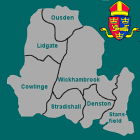  |
 |
 |
 |
 |
| Sun 15 Feb 2026 |

Church News Volume 6, Issue 10 (October 2005)Dear friends, "Listen! A sower went out to sow …" (Matthew 13:3) An author was being interviewed following the success of her first novel which had become a best-seller in record time. She was asked how it felt to be so successful so early in her writing career. The author replied: "When I'd finished that book it felt like I'd given birth to a child. It was hard work and painful but once it was completed I had a huge sense of achievement. Then I felt a huge anxiety as I sent my child out into the world. I couldn't protect it, or me, from criticism or rejection. I could only send it out and hope and trust that some people would like it and value it. Now it's done so well I feel proud and happy but I also feel a sense of wonder that I could produce such a piece of work." We live our lives in a public arena and we influence people, often in ways we cannot imagine. As the author felt vulnerable when her book was published so we, too, may be aware of our inability to control the way others react to us. Sometimes, though, we may feel that there is a force much greater than ourselves working in our lives and communicating with the people around us. Our words and actions, like the seed of the parable of the sower, scatter around our homes, work places, churches and neighbourhoods. What happens when our words and actions are centred on making the word of God known in our communities? Perhaps when Jesus is talking in the parable about the word of God he is also talking about himself as the living word the Word that was in the beginning with God and which became human and lived among us. The seed in the parable might also represent the life of the Spirit which Jesus lived on earth a life of loving, giving and caring and a joyful trusting in God's promises. People responded to Jesus in different ways. Some took no notice of him at all. Some, among them the Pharisees, were hostile to him like the rocky ground where the seed just could not take root. Some came eagerly to hear him speak and gladly accepted his healing but were not prepared to take things any further, to allow him fully into their lives to transform them. But some did watch, listen, learn and love and in their turn they lived out the life of the Word of God. Their lives witnessed to the grace and beauty of the Word made flesh and drew many others to that Word, that Life of Love that succeeded in the task which he was sent to accomplish. We are called to follow Jesus and to live the life of Gods Spirit as he did. When we watch Jesus teaching and healing we see that he lives his life in much the same way as the sower sows the seed. He does not select the best people to talk to, the intelligent ones who are most likely to understand what he says; he does not only heal those who are likely to be of use to him in the future; he does not just spend time with people who can give him influence, power and status. He lives and loves indiscriminately, some say irresponsibly, mixing with disreputable, ungrateful and shallow people because he knows that in doing so he will also be loving the people who will respond with their love and offer their lives to be healed and transformed. Our calling is to live our lives with the same sort of reckless love. Like Jesus we may face rejection, scorn or ridicule. Like Jesus, we may be accepted at a very shallow level and then discarded when things get difficult, we may find it hard to make ourselves heard above the noise and distraction that can drown out our music. We cannot control or demand specific responses to ourselves or the message we pass on. All we can do is act out of loving-kindness to everyone and trust God to fulfil his purpose. We may never know the long-term effect we have on people through our words and actions but we can trust that God will continue to work after we've moved on. We can prepare the ground and sow the seed, but it is God who ultimately causes seeds to take root, to grow, to flourish and to bear abundant fruit. Revd Ian M. Finn |

